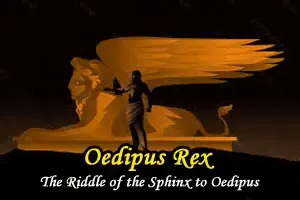Oedipus Rex: The Riddle of the Sphinx to Oedipus
Q. What was the riddle posed by Sphinx to Oedipus?
Answer: The riddle of the Sphinx and Oedipus's encounter with the mythical creature are part of Greek mythology and are primarily found in the play "Oedipus Rex" (also known as "Oedipus the King") by the ancient Greek playwright Sophocles. "Oedipus Rex" is one of the three Theban plays written by Sophocles, and it explores the tragic story of Oedipus, the king of Thebes, as he attempts to uncover the truth about his identity and destiny. The Sphinx and the riddle are pivotal elements in the narrative, representing challenges and mysteries that Oedipus must confront on his journey.
The riddle of the Sphinx presented a profound enigma, one that encapsulated the essence of human existence and the passage of time. The intricacy of the riddle lay not only in its words but in the layers of meaning it carried, reflecting the complexities of life itself.
The Sphinx, a mythical creature with the body of a lion and the head of a human, guarded the entrance to the city of Thebes. To gain access to the city, travelers had to solve the Sphinx's riddle. Failure to do so resulted in a grim fate – the Sphinx would devour those who could not unravel the mystery. Oedipus, arriving at Thebes, faced this daunting challenge and confronted the enigmatic query posed by the Sphinx.
The riddle was crafted with poetic elegance: "What creature has one voice and yet becomes four-footed and two-footed and three-footed?" The Sphinx's inquiry demanded not only intellectual prowess but a profound understanding of the human journey. The essence of the riddle lay in the transformation of a singular entity through different stages of life.
The answer, as provided by Oedipus, was "man." The layers of symbolism embedded in this solution were rich and resonant. The one voice represented the unity of human existence, the singular thread that ties the diverse experiences of life together. Yet, the subsequent references to four-footed, two-footed, and three-footed encompassed the stages of life – infancy, adulthood, and old age.
As a baby, man crawls on all fours, symbolizing the first stage of the journey. The two-footed stage represents adulthood, where humans stand on two legs, signifying independence and maturity. Finally, the three-footed stage encapsulates old age, where a cane becomes the third "leg" supporting the individual. In this elegant response, Oedipus not only solved the riddle but captured the essence of the human experience in a succinct and profound manner.
The brilliance of Oedipus's answer lies in its universality. The riddle transcends the specific circumstances of Oedipus and Thebes, touching upon the broader narrative of human life. It speaks to the inevitability of aging, the cyclical nature of existence, and the shared journey that all individuals traverse.
Moreover, Oedipus's triumph over the Sphinx had deeper implications within the context of the larger myth. His success marked a turning point in his destiny, setting the stage for the unfolding of his tragic fate. The victory over the Sphinx showcased Oedipus's intellect and resourcefulness, qualities that would be central to his character as he grappled with the complexities of his own identity and the unfolding drama of his life.
In essence, the riddle of the Sphinx and Oedipus's answer encapsulate the timeless themes of human experience – the inevitability of change, the passage of time, and the interconnectedness of our shared journey. The myth endures not only as a tale of ancient Greek literature but as a reflection of the enduring mysteries and complexities of the human condition.
*****
Read also:
👉 Oedipus Rex by Sophocles – Oedipus as a tragic hero
👉 Agamemnon in The Iliad by Homer – Role of Agamemnon
👉 The Book of Assembly Hall - Dharma, Dicing and Draupadi
👉 Mahabharata – Discussion in the light of Epic Tradition
👉 The Illiad, (Book – I and Book II): The Character of Achilles
👉 The Pot of Gold – Plautus’ representation of Augustan Roman society
👉 Abhijnanasakuntalam – Role of Kanva in Abhijnanasakuntalam (CC - I)




.webp)
.webp)












0 Comments
I'm pleased to hear from you. Without any hesitation, kindly leave your valuable words in the Comment Box